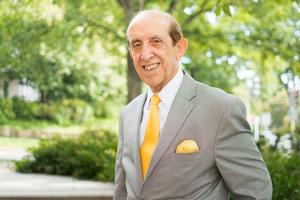Could a system of finance dating back to the seventh century offer modern solutions to problems like college debt and crumbling infrastructure? Dr. Ghiyath Nakshbendi, chair and founder of the graduate certificate in Islamic finance at the Kogod School of Business, believes so.
“In America, millennials are growing tired of the system of interest, especially when it comes to student loans. They are looking for something that is different,” Dr. Nakshbendi explains. “We also have big problems with infrastructure. More than 54,000 bridges need repairing, for example. Islamic finance could be a way to fund these projects.”
Kogod’s graduate certificate in Islamic finance is the first of its kind in the US. Although Islamic finance has been practiced for over a millennium in Muslim countries, it is relatively new to the US, with the Office of the Comptroller of Currency approving its use for home lending in 1997. It has taken strong root in Europe, with nations like the United Kingdom, Germany, and Luxembourg at the forefront. In 2018, the UK’s largest Islamic bank, Al Rayan Bank, said about one-third of its customers were non-Muslim, up from one-eighth in 2010. So what is driving Western interest in this ancient approach?
“Islamic finance is not for Muslims only,” Dr. Nakshbendi states. “It is for humanity.”
Islamic finance is an alternative to conventional finance. Sharia law—Islamic law based on the religious principles of the Quran and the Hadith—forbids the charging of interest. Because money is only a way of defining value, making money from money is not permissible, rendering financial products like options, futures, and derivatives moot. In Islamic finance, lending can only occur in the context of a sale or exchange of some sort, meaning investments must result in something tangible.
If interest is forbidden, how do Islamic institutions interact with conventional financial markets? Profit-and-loss sharing contracts are one way, where an Islamic bank pools investors’ money and assumes a share of the profits and losses. Another way is renting or leasing products and services. Or a bank can form a partnership with the company it is sponsoring, reaping some of the benefits once the company produces its product. There are also sukuk—Islamic bonds.
Malaysia, a leader in Islamic banking, has been at the forefront of using Islamic finance to fund environmental sustainability projects. In 2018, Malaysia’s Securities Commission debuted the world’s first green sukuk, an Islamic bond used to fund environmentally sustainable infrastructure projects. Two Malaysian investment companies have already issued green sukuk to fund the construction of large-scale solar power plants in multiple districts.
Islamic finance is even finding its way into cryptocurrency. Rain, a Bahrain-based cryptocurrency exchange, announced in February that it had passed a Sharia compliance certification and bills itself as “the most regulated and secure digital currency exchange in the Middle East.”
“Malaysia and Bahrain are setting global best practice standards of Islamic finance. Business juggernauts like Kuwait and Saudi Arabia have been relying on this system, and they are at the forefront of all sorts of innovations,” says Dr. Nakshbendi.
The Islamic finance program attracts a wide variety of students who are eager to learn an alternative way of doing business, from creating community-minded, sustainable development to avoiding predatory lending and promoting inclusive growth.
Recent graduate Bianca Tardio sees Islamic finance as an avenue for positive societal change. “A lot of conventional finance funding provides more of a debt problem, which people obviously have trouble getting out of,” Tardio says. “Islamic finance would be an alternative to benefit not just companies or corporations but actually the people.”
Many students see Islamic finance gaining traction in the world economy and want to make sure they’re prepared to be a part of this growing global branch of finance. For them, the certificate opens up a world of career prospects.
“If one of the regular banking institutions wants to open an Islamic finance branch, someone with this certificate will be the first they will ask to get involved,” Dr. Nakshbendi says. “Even though the figure is from 2016, a study found that there are more than 50,000 jobs in Islamic finance worldwide.”
In 2017, total worldwide Islamic finance assets were estimated at $2 trillion. By 2021, they are expected to grow to $3.5 trillion. In the US, banks like Standard Chartered and JP Morgan—alongside several smaller banking institutions—are already offering Islamic personal and business banking services.
Students graduating from the certificate program are positioned to be at the forefront of Islamic finance’s growth in the US and around the world. From infrastructure development to climate-friendly investments to cryptocurrency, Islamic finance’s inherent innovation invites further exploring.
Though it has ancient roots, Islamic finance is far from irrelevant or antiquated; it offers solutions to some of the world’s most entrenched modern problems. Rather than focusing on wealth generation, Islamic finance offers an avenue to community-focused development and socially responsible investing.
Learn more about the graduate certificate in Islamic finance from the Kogod School of Business.
